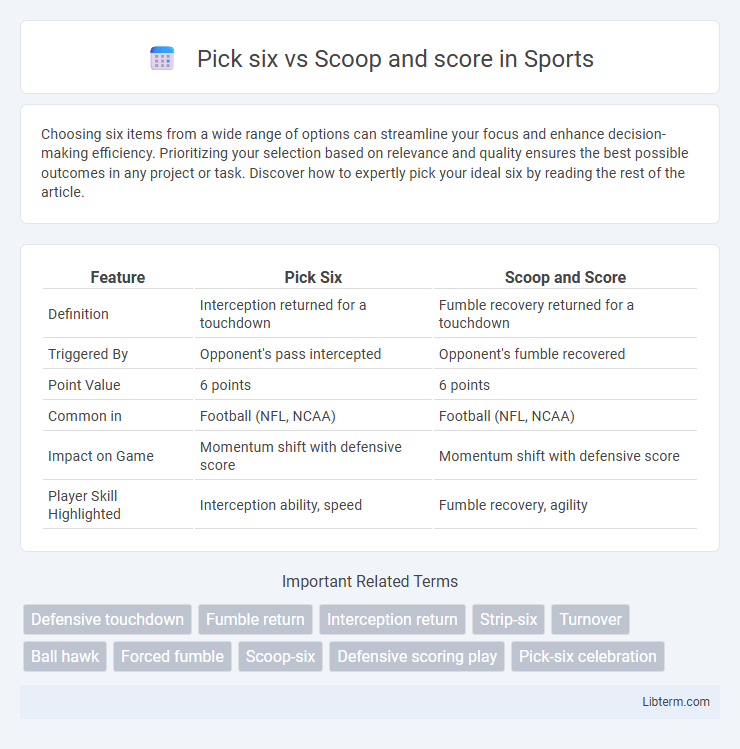Choosing six items from a wide range of options can streamline your focus and enhance decision-making efficiency. Prioritizing your selection based on relevance and quality ensures the best possible outcomes in any project or task. Discover how to expertly pick your ideal six by reading the rest of the article.
Table of Comparison
| Feature | Pick Six | Scoop and Score |
|---|---|---|
| Definition | Interception returned for a touchdown | Fumble recovery returned for a touchdown |
| Triggered By | Opponent's pass intercepted | Opponent's fumble recovered |
| Point Value | 6 points | 6 points |
| Common in | Football (NFL, NCAA) | Football (NFL, NCAA) |
| Impact on Game | Momentum shift with defensive score | Momentum shift with defensive score |
| Player Skill Highlighted | Interception ability, speed | Fumble recovery, agility |
Understanding Pick Six: Definition and Key Moments
Pick Six refers to an interception returned by a defensive player for a touchdown, significantly impacting the game's momentum and score. Key moments in a Pick Six highlight defensive skill, anticipation, and game-changing plays that shift control to the intercepting team. Understanding Pick Six involves recognizing its rarity and potential to alter playoff outcomes or season standings.
What is a Scoop and Score in Football?
A Scoop and Score in football occurs when a defensive player recovers a fumble and immediately runs it back for a touchdown, showcasing quick reflexes and field awareness. This play can dramatically shift momentum by converting a defensive mistake into instant points. Understanding the difference highlights that while Pick Six refers to an interception returned for a touchdown, a Scoop and Score specifically involves recovering a fumble and scoring.
Key Differences Between Pick Six and Scoop and Score
Pick Six involves intercepting a pass and returning it for a touchdown, directly impacting the game's score by defensive scoring. Scoop and Score occurs when a fumble is recovered and returned for a touchdown, emphasizing ball control and opportunistic defense. Both plays shift momentum but differ in the type of turnover and recovery, with Pick Sixs targeting interceptions and Scoop and Scores focusing on fumble recoveries.
How Pick Six Impacts Game Momentum
Pick Six dramatically shifts game momentum by instantly converting a defensive play into a touchdown, energizing the intercepting team and demoralizing the opponent. This sudden change can alter the strategy, forcing the trailing team to take more risks and potentially create more errors. In contrast, Scoop and Score, while also a defensive touchdown, often stems from a fumble recovery and can quickly swing momentum but typically results from more chaotic plays.
Defensive Strategies to Force Pick Six Plays
Implementing aggressive defensive strategies like tight man-to-man coverage and well-timed blitzes increases the likelihood of defensive backs intercepting passes, leading to pick six opportunities. Emphasizing lane discipline and maintaining pressure on the quarterback disrupts offensive plays, forcing hurried throws that defenders can capitalize on for scoop and score scenarios. Training defensive units to anticipate offensive patterns and secure loose balls enhances the chances of converting turnovers into immediate touchdowns during pick six plays.
Creating Opportunities for Scoop and Score
Scoop and Score emphasizes creating rapid scoring opportunities by allowing players to recover loose balls and immediately advance toward the endzone, maximizing quick offensive transitions. Unlike Pick Six, which focuses on intercepting the ball and returning it for a touchdown, Scoop and Score prioritizes defensive awareness and agility to capitalize on fumbles or recoveries for immediate points. This strategy enhances team dynamics by encouraging players to maintain high alertness and positioning for opportunistic ball recoveries during active plays.
Historic NFL Pick Six Moments
Historic NFL pick six moments have dramatically shifted the momentum of crucial games, often turning defensive plays into game-winning touchdowns. Memorable instances include Richard Sherman's 2013 NFC Championship interception return and Malcolm Butler's playoff pick six against the Colts in 2013. These pivotal plays underscore the defensive prowess and impact of pick sixes compared to scoop and score touchdowns, which derive from forced fumbles rather than interceptions.
Memorable Scoop and Score Plays in Football History
Pick Six and Scoop and Score represent two dynamic defensive scoring plays in football, where a Pick Six occurs when a defender intercepts a pass and returns it for a touchdown, while a Scoop and Score happens when a defender recovers a fumble and scores. Memorable Scoop and Score plays include Malcolm Jenkins' game-winning recovery in the 2013 NFC Championship, highlighting the impact of defensive opportunism. The adrenaline rush from these plays often shifts momentum dramatically, etching moments like Richard Sherman's 2013 NFC Championship interception return into football lore.
Statistical Comparison: Pick Six vs Scoop and Score
Pick Six touchdowns involve intercepting a pass and returning it directly for a six-point score, whereas Scoop and Score occurs when a defensive player recovers a fumble and returns it for a touchdown. Statistically, Pick Sixes are more common due to the higher frequency of interceptions compared to fumble recoveries returned for touchdowns. Defensive players achieve Pick Sixes at a rate of approximately 10-15% of total interceptions, while Scoop and Score touchdowns represent about 5-7% of recovered fumbles returned for scores.
Training Drills for Defenders: Mastering Turnover Touchdowns
Training drills for defenders focusing on Pick Six vs Scoop and Score emphasize agility, anticipation, and ball skills to capitalize on interception and fumble recovery opportunities. Coaches integrate reaction time exercises, lateral movement drills, and ball control techniques to enhance defenders' ability to secure turnovers and convert them into touchdowns. Mastery of these drills improves defensive scoring potential by increasing the frequency and success rate of turnover touchdowns.
Pick six Infographic

 libterm.com
libterm.com